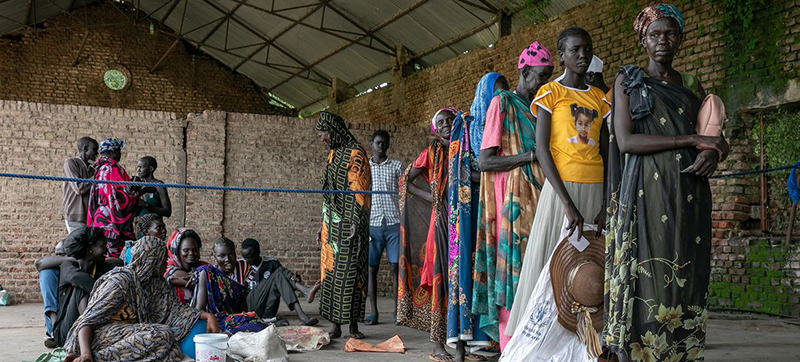Looming hunger emergency for South Sudanese families fleeing war

A hunger emergency is looming for scores of South Sudanese families fleeing the war in Sudan, the World Food Programme (WFP) warned on Tuesday.
Nearly 300,000 people have arrived in South Sudan since the conflict began across the border in mid-April, most of whom are returnees.
Among them, one in five children is malnourished and 90 per cent of families are experiencing moderate or severe food insecurity.
Screening data from the border crossing also revealed that more than a quarter of pregnant and breastfeeding women are malnourished.
Fleeing danger, finding disaster
“We are seeing families leave one disaster for another as they flee danger in Sudan only to find despair in South Sudan,” said Mary-Ellen McGroarty, WFP’s Country Director in South Sudan.
The returnees are coming back to a country that is already facing unprecedented humanitarian needs.
Years of conflict, violence, food insecurity, climate impacts and public health challenges have left some 9.4 million people in need of protection and assistance, according to the UN humanitarian affairs office, OCHA.
Robbed on the run
WFP said the rainy season has made conditions at crowded transit centres and border crossings even more difficult as flooding is worsening food insecurity and contributing to the spread of disease.
Many families also report being robbed and experiencing violence as they escaped from Sudan with nothing but the clothes on their backs. Families arriving now are in an even more vulnerable condition than those who fled in the early weeks of the conflict.
WFP is providing food assistance at the border, delivering hot meals, high-energy biscuits, dry rations, and cash-based transfers. Children and mothers are also receiving specialized nutrition support.
Mounting needs, dwindling funds
“The humanitarian situation for returnees is unacceptable and WFP is struggling to meet the mounting humanitarian needs at the border,” said Ms. McGroarty. “We simply do not have the resources to provide life-saving assistance to those who need it most.”
WFP urgently requires more than $120 million to ramp up support over the next few months. Significant resources are also needed to help people move onwards from the crowded border area and to support returnees as they rebuild their lives in a country where many have never actually lived.
Across South Sudan, WFP has a funding gap of $536 million over the next six months and has only reached 40 per cent of food insecure people with assistance. Furthermore, these beneficiaries are only receiving half rations due to funding shortfalls, which is further entrenching food insecurity.



